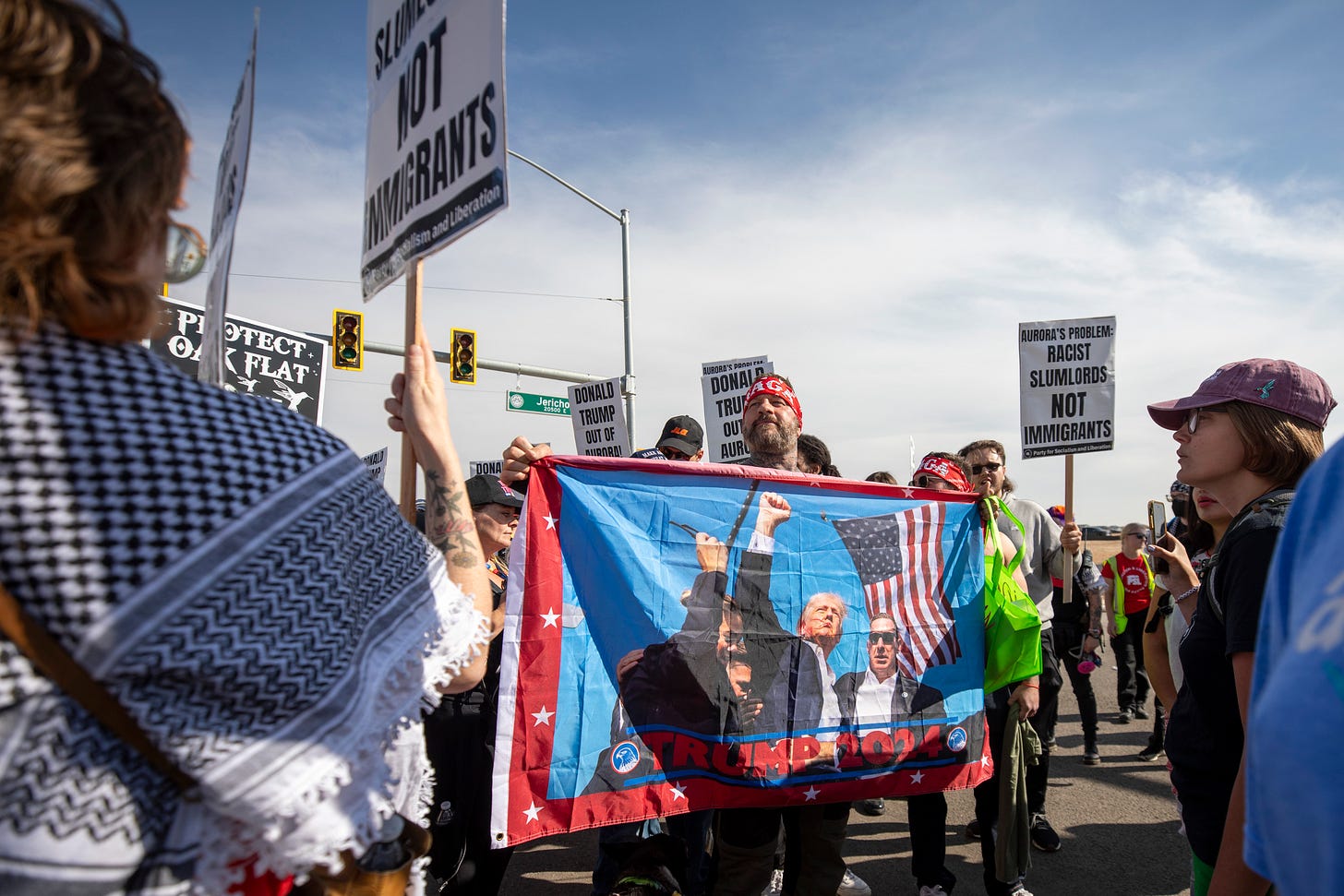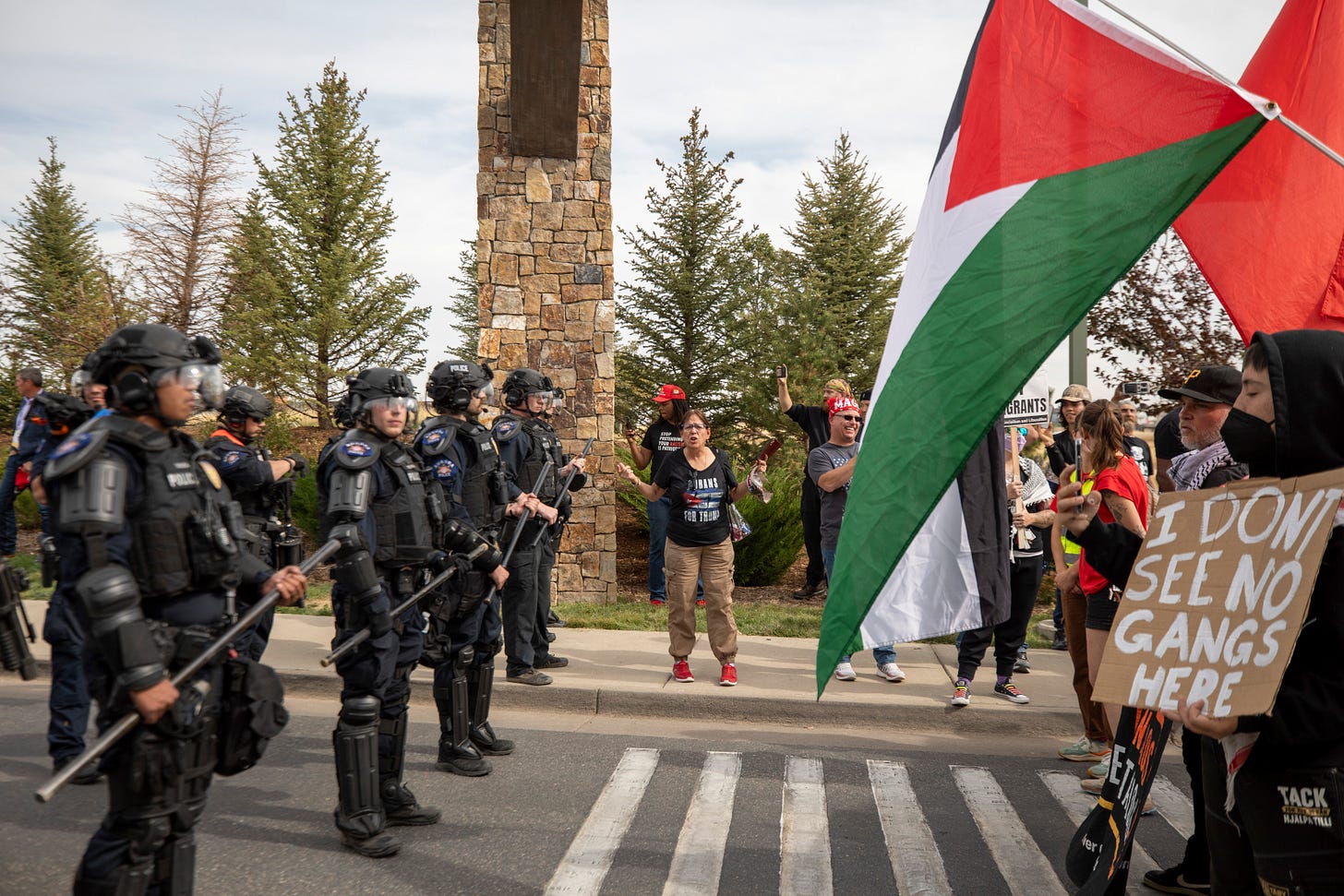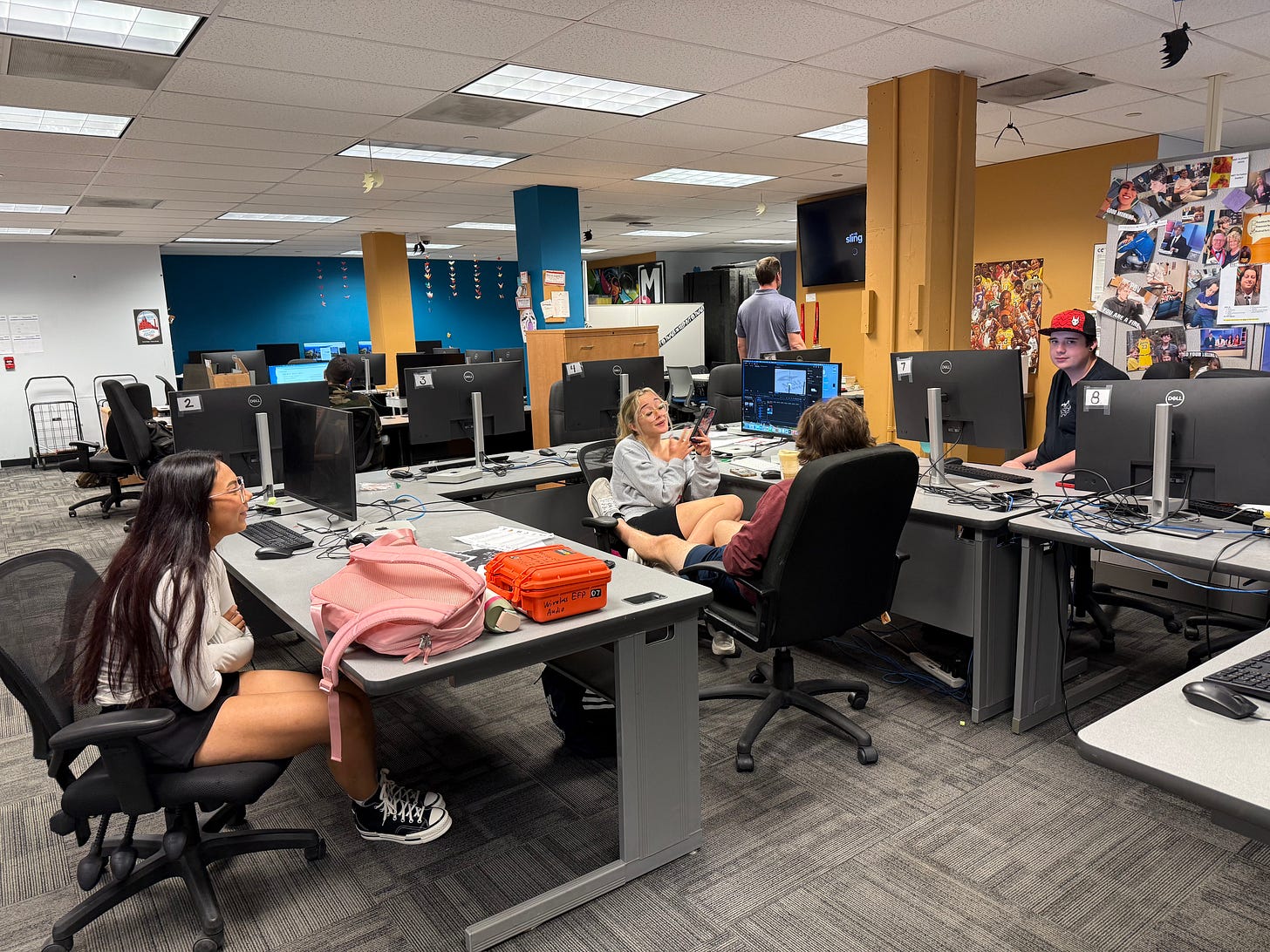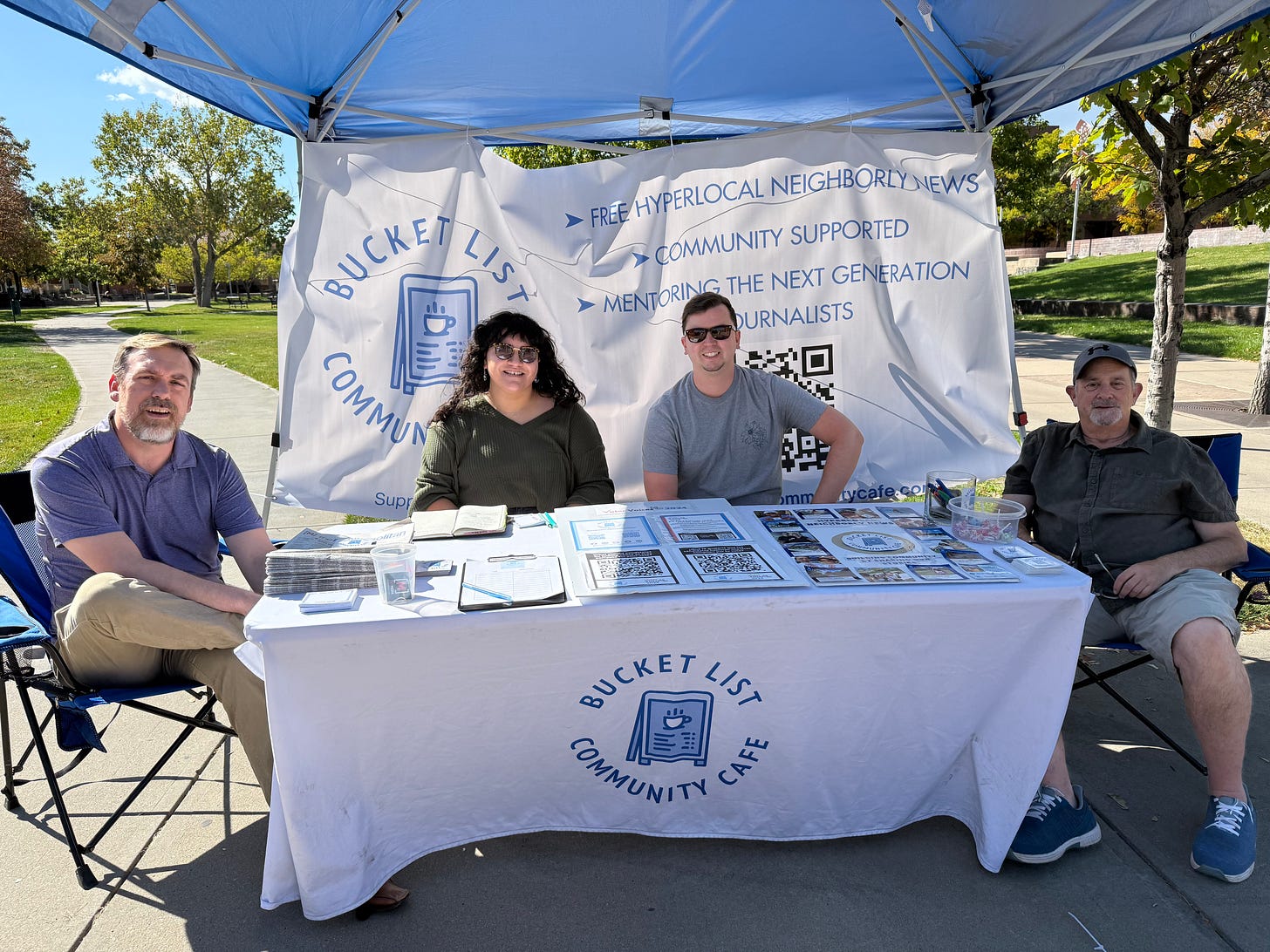Press pass denied at Trump rally. Denver student newspaper covers it anyway
How a hyperlocal newsroom relies on student journalists for Gen Z voices in election coverage

When former President Donald Trump said he would visit Aurora, Colorado, student journalists at the Metropolitan State University of Denver were ready.
They planned to focus their coverage on immigration, given Trump's past comments calling the city a “war zone” filled with migrant crime and the university’s status as a Hispanic-serving institution.
“A lot of us are Hispanic, first-generation immigrants, and those identities are being heavily debated in this election,” said Isabel Guzman, editor-in-chief of student newspaper The Metropolitan. “It’s really important and relevant to our student voice that we cover the event.”
So when Trump’s campaign officially announced the Aurora stop just four days in advance, Guzman applied for press credentials immediately.
But the campaign denied her request without explanation.
“All they asked of you when you fill out the request is your name and what outlet you work for, and it wasn’t clear on what the criteria were for deciding,” she said, suspecting her outlet was dismissed because it's a student newspaper.
What happened in Colorado mirrors the challenges student journalists face in other states when trying to cover political rallies or gain access to powerful figures and elected officials.
After the denial, Guzman appealed via email but never received a response.
The Nutgraf also reached out to the Trump campaign for comment but received no reply.
Student journalists reported similar experiences in Wisconsin, Kentucky, Iowa and Pennsylvania — where candidates often visit this cycle.
The Pitt News, the student newspaper at the University of Pittsburg, reported that student media organizations in the state had their press access denied at Trump campaign events.
The paper itself was not allowed to attend Trump’s rallies in Butler and at Indiana University of Pennsylvania, it said in the report.
For The Globe, Point Park University’s student newspaper, EIC Cassandra Harris was kicked out by security at a recent Butler rally, she told The Pitt News.
Photo Editor Caleb McCartney managed to cover the rally for just over an hour before he was also escorted out.
“They were like, ‘Well, you’re not press, you’re a student journalist, so you’re not real,” McCartney told The Pitt News.
The Duquesne Duke, Duquesne University’s student newspaper, had its press credentials denied twice for the Butler rally, according to The Pitt News.
One editor managed to attend as a general attendee but couldn’t get access to the press area.
Meanwhile in Michigan, The Delta Collegiate of Delta College also faced the problem at a rally at Saginaw Valley State University.
Student journalists Mikaila Bluew and Onnie Stone wrote they planned to attend with general tickets after being denied but were escorted out.
“Upon speaking with the coordinator, we were abruptly forced to leave the premises,” they wrote. “While expressing our intention to comply with their demand, we asked what the reason for our removal was.”
According to them, security didn’t explain why they were a security risk.
“We left with the sense that we were unwanted,” they wrote.

Back in Denver, without a press pass, Guzman sent Managing Editor Mariana Ortega Rivera to cover a protest outside the rally instead.
The story focuses on how immigrants in the Denver metro area felt overlooked and frustrated with the “perpetuation of harmful stereotypes in media and political rhetoric.”
While watching a livestream was an option, Guzman emphasized the importance of being present at events to capture the student perspective.
“We were a little bit scared because Trump rallies are known to be a little negative towards the media,” Guzman said. “We knew that would really impact the way we told the story.”
Guzman said student media deserves more recognition in the industry.
“Maybe just more honored in the perception of people who are hosting press events,” she said. “I’m always going to be a big fan of little, local media. I think that they deserve more access to things.”

Hyperlocal outlet relies on students for Gen Z voices
But if student journalists have one thing professionals often don’t, it’s direct access to their peers.
That’s the goal of a partnership between Denver’s hyperlocal news outlet, Bucket List Community Cafe and MSU Denver’s student newsrooms.
Focusing on local issues and community stories, Bucket List’s collaboration with The Metropolitan and Met TV aims to elevate young voices often underrepresented in mainstream election coverage.
Student reporters will be on the ground, sharing updates across the newspaper, TV and Bucket List platforms. For example, The Metropolitan’s Trump rally story also ran on Bucket List’s website.
Journalism professors and political analysts from the campus will provide context for the stories on election day. And yes, there will be pizza.
Vicky Collins, publisher of Bucket List, said national journalists tend to focus on “the horse race” aspects of elections, which often magnify divisions, whereas student journalists and Bucket List prioritize informing voters about the issues that matter most.
Their efforts include a survey initiative called Voter Voices, which MSU student journalists have been promoting to young voters since the spring.
From the survey, they found young people are concerned about rising living costs and how “annoyed” and “anxious” they are having to choose between candidates they don’t feel represent them.
“Just the fact that we have university students covering election night — not just at the university, but in the community — I think is really significant,” Collins said.
This election season is Guzman’s first time leading her team. She said it’s a bit nerve-wracking, but collaborating with Bucket List has helped.
Because the newspaper publishes monthly, the election edition will come out a week after Nov. 5, which is adding some pressure.
“I don’t know exactly what I’m going to put there if it’s not going to be delivered to campus until a week after we send it out to the printer,” she said, noting the results would come after the layout deadline.
Still, Guzman believes student journalists have a unique advantage in talking to young people due to their proximity to campus life.
“They see me as a student before they see me as a journalist,” Guzman said. “They feel more comfortable talking to me because I’m like them. So that’s an advantage that we bring to the table.”

💬 I want to hear from you: What challenges do you face as a student journalist covering people in power? How do you overcome it? Reach me at nutgrafnews@gmail.com.
🎧 Extra! Extra!
The Nutgraf, in collaboration with The Journalism Salute, hosted a panel Oct. 17 on how student journalists are covering the 2024 election.
Hear from The Loyolan, The Daily Lobo and OU Daily in the podcast recap below on how they traveled across swing states and how they’re preparing for the unexpected.
Story Spotlight:
🚔 The Minnesota Daily reporter was detained and had his belongings confiscated by the University of Minnesota Police while covering a protest and wearing a press vest.
⛔ The University of Kentucky denied an open records request from the Kentucky Kernel for records of non-student guests of a residence hall, citing privacy and ongoing investigation. The newspaper’s lawyer said that’s not how it works.
📻 Wisconsin student journalists: Talk show hosts in the state often spread political misinformation. Notably, stations with the largest audiences and most advertising gave platforms to hosts spreading the most misinformation — one host shared 39 inaccuracies in a four-hour program, Wisconsin Watch reported.
👥 The Slate at Shippensburg University endorsed the Democratic ticket for the White House. But the minority of the editorial board called the move “a rarity,” noting concerns around maintaining neutrality.
Check out the Student Press Law Center’s story on whether student media should endorse political candidates.
📰 On Indiana Daily Student’s print cut, university officials said the move was a necessary one to survive in the evolving industry landscape. Expenses for professional staff and student salaries were prioritized. In response, the student journalists said newsrooms don’t vanish but are gutted.
🗳️ Check out these election issues from The Rocky Mountain Collegian, Technician, The Daily Lobo, The Signpost, The Vanguard Review, The Paisano and The Highlander for inspiration!
Featured Opportunities:
McClatchy is hosting an info session for its internship Oct. 30.
The Athletic is looking for a creative development student intern. Apply before Nov. 8.
The School Superintendents Association is looking for a reporting/photographer intern to cover its New Orleans conference in March. The deadline to apply is Nov. 15.
Apply to The Hechinger Report’s education reporting internship before Dec. 3.
KQED in San Francisco has several paid internship positions open in video production, events, and communication for Jan- June 2025.
Lincoln Journal Star in Nebraska is looking for a news intern. Other Lee Enterprises outlets are hiring interns too.
Democracy Now is hiring a digital fellow and a video news production fellow.







